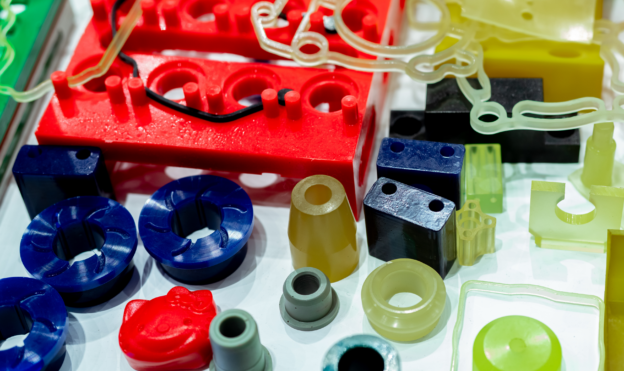Cast urethane products are synonymous with diversity and adaptability. Their significance lies in the ability to be tailored and manufactured to unique specifications, setting industry standards for customized solutions. The advantages of customization in polyurethane components become apparent as we explore the vast applications and benefits.
Dive into Uniflex, Inc.’s 40-year journey as a cast urethane trailblazer, producing tens of thousands of top-tier urethane parts. Our expertise combines decades of experience with premium urethane formulations, offering custom-molded solutions tailored to your specifications. Explore material grades, from high-performance to FDA-approved options, in our state-of-the-art facility, known for low-cost production and high-quality cast urethane rubber products.
👉Also Read: Abrasion-Resistant Polyurethane Coated Rollers: Unleash the Power of Endurance
Custom Polyurethane Products
The term “custom polyurethane products” encapsulates a world of possibilities. Custom molding plays a pivotal role in shaping these products, ensuring that the outcome aligns precisely with the desired specifications. What makes this process even more appealing is its cost-effective nature. In an era where tailored solutions are paramount, the ability to customize polyurethane components is a game-changer.
Cast Urethane Products in High Volume Production
Navigating the challenges of high-volume plastic production is where cast urethane shines. It has become the industry-standard solution for efficiently meeting the demands of industrial applications. The versatility of cast urethane products comes to the fore as they seamlessly adapt to high-volume manufacturing requirements.
Materials and Properties
Polyurethane offers a broad range of physical properties, making it suitable for a wide variety of applications. It can be tailored to meet specific requirements such as flexibility, durability, and chemical resistance.
The cast urethane process allows for the production of highly customized parts. By adjusting the formulation of polyurethane, manufacturers can control factors like hardness, elasticity, and wear resistance to meet the needs of a particular application.
Polyurethane is known for its excellent abrasion resistance, making it suitable for applications where wear and tear are significant concerns. This property is crucial in industries such as mining, agriculture, and material handling.
Cast urethane products made with polyurethane can exhibit high impact resistance, providing durability in applications where parts are subjected to sudden forces or shocks.
Polyurethane formulations can be adjusted to enhance resistance to chemicals and solvents, expanding the range of applications in which cast urethane products can be used.
Comparing Polyurethane to Other Elastomers and Materials
Rubber (Natural and Synthetic): Polyurethane often offers better abrasion resistance and durability compared to rubber. Rubber may have better resilience and elasticity in certain applications.
Plastics: Polyurethane can provide better impact resistance than some plastics. It also tends to be more flexible and resilient, making it suitable for applications where deformation and recovery are essential.
Metal: Polyurethane can be a lightweight alternative to metal, offering benefits such as reduced noise and vibration transmission. It is also corrosion-resistant, which can be advantageous in certain environments.
Cast Urethane Products in Various Industries
From urethane wheels and rollers transforming material handling to custom molded urethane polyurethane bushings enhancing automotive and machinery performance, the applications span a spectrum. Urethane gaskets and bearings find their place in industrial equipment manufacture, showcasing the adaptability of cast urethane across diverse industries.
Production Process
In the production process of cast urethane products, several key steps ensure precision and consistency.
Mold Preparation: Prepare molds to replicate the desired product shape.
Material Mixing: Mix polyol and isocyanate to create liquid polyurethane.
Pouring or Injection: Fill the mold with liquid polyurethane and allow it to cure.
Curing: Cure the material through chemical reactions or physical processes.
Demolding: Open the mold and remove the cast urethane product.
Post-Curing (Optional): Additional curing may be done to enhance properties.
Achieving Precision and Consistency in Cast Urethane Products
Mold Design and Fabrication: Design high-quality molds for accurate product replication.
Material Formulation: Precisely control polyurethane components for desired properties.
Process Control: Maintain tight control over temperature, pressure, and curing time.
Quality Assurance in Mixing: Monitor the mixing process to ensure proper ratios and additives.
Quality Control and Inspection in Cast Urethane Production
Visual Inspection: Check for surface defects and visual imperfections.
Dimensional Inspection: Measure product dimensions and tolerances.
Durometer Testing: Verify product hardness for the intended application.
Material Testing: Test properties like tensile strength and abrasion resistance.
Batch Testing: Ensure consistency across multiple units.
Documentation and Traceability: Document each step and track production details for quality control.
👉Also Read: Enhancing Durability: How to Get Polyurethane Sheets with Superior Abrasion Resistance
Elevate Your Projects with Uniflex, Inc.’s Cast Urethane Solutions
As you explore the expansive applications and benefits of cast urethane, Uniflex, Inc. invites you to embark on a journey where customization meets unparalleled quality. Contact Uniflex, Inc. today at 248-486-6000 to discover how our cast polyurethane solutions can elevate your projects, setting new benchmarks in the dynamic landscape of urethane applications.


